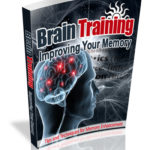
Brain Training
Why It’s Important to Train Our Brains
For as much as we believe we train our brains and give them a good workout, we seldom actually do it on a regular basis. In most cases, our brains are not used in a balanced way. We’re creatures of habit. We find a way to do things that we consider comfortable and we seldom change our ways.
Many of the physical activities we perform each day are done with one side of our body, without even giving it much though. If we’re not giving something much thought, we’re not exercising or training our brains.
We also get very set in the way we feel emotionally about things or people, which does not give our brains much stimulation or cause for thought. These are not things we consciously set out to do in our lives but rather habits that have developed because of the way our brains function, mostly because of genetics. For instance, it’s not our choice to be right handed. It just happens that way, and we seldom give it much thought.
We are also the result of year’s old biological factors that affect our skills, moods and social habits. Our brains and brain functions are also the result of our culture and upbringing. Although many of us argue the old nature versus nurture theory, studies indicate that training our brains to be more active can play an important role in how we act, feel and how successful we are in life.
It makes sense that someone that works at solving word or mathematical problems every day is going to have more brain activity than someone does that sleeps half the day and watches cartoons the other half. The more we work our brains, the better our brains are going to work for us.
While there’s a strong belief that brain training is beneficial for individuals that may suffer from poor memory or lack of concentration, brain training is actually recommended for anyone with a brain. Our brains needs steady stimulation to become motivated to work for us in the way we need it to work.
Brain training has been used for patients with learning disabilities, insomnia, cognitive impairment, traumatic brain injury, attention deficit and more. It’s been known to help people improve their focus and concentration.
Brain training therapists feel that brain training exercises are highly beneficial in keeping our brains young and healthy. Many brain training games are now on the market. While the games may not be scientifically proven or endorsed, the users feel they have made a real difference in their lives.
Purpose of Brain Training
Brain training games have become very popular in recent years along with all the topics regarding brain training and its importance in our lives. Brain training is particularly helpful in improving our brainpower and cognitive development and enhancing our memory. If our brains never got any training, they’d become very stagnant and passive.
As we get older, our memory tends to decrease and our mind doesn’t seem to be quite as sharp as when we were younger. Most of us just attribute this to the aging process. While aging can cause these changes, brain training can help to slow the process down and keep our brain fresh and young. Here is an example of why braining training can be very important to our lives. A student is very good at math in school. It’s actually his favorite subject because he finds it so easy. Once he gets out of school, he gets a job where he seldom has to do any problems. When math is required, it’s done automatically on a computer. After a few years of this, he’s asked to help his son with math.
Suddenly, he discovers math is not coming to him as naturally as it once did. Is it because he’s older or because his brain hasn’t had any mathematical challenges in many years? Once he begins helping his son with his math every day, he begins retraining his brain on how to do math and it begins coming back to him. This is how brain training can help us in other areas of our lives as well.
The purpose of braining training is to keep our memories refreshed and our minds challenged with new ideas, thoughts and challenges. Helping his son with problems he hadn’t done in years provided his brain with some much needed training and stimulation. His brain had to think. While you may think your brain is working every minute of the day, it’s only really working when you’re requiring it to think, particularly about something new or different.
This is why doing puzzles, playing Chess, or Sudoku and other mind boggling puzzles can be such an excellent form of brain training. The purpose of brain training is to give the brain work to do, and games and puzzles will definitely give your brain a workout. Another purpose of brain training is to help develop our brain fitness and improve our cognitive development, which is responsible for us learning things and developing throughout life.
Why Brain Training is so Important
Do you ever take the time to consider all the things our brain does for us? From the time we were young, we were taught that the brain is what tells our body what to do. Whatever function we want our body to do, our brain tells it to do it. However, our brain has many more functions that are equally, if not more, important.
Our brains keep us mentally alert and healthy, so it’s vital that we keep our brains as mentally healthy as possible. One important way of doing this is through brain training. You’re probably wondering why, if our brains are such an important part of our bodies, why they need training. Our brains, much like our bodies, need constant stimulation and activity to keep them healthy and strong.
If we lay around the house all day and didn’t get any physical exercise, we would probably gain weight and becoming very unfit and unhealthy. Our brains need the same kind of exercise. They may not become unfit and unhealthy but they’ll fail to continue growing. Things we may have remembered years ago, we may now forget. Many people automatically associate memory loss with old age or aging in general. While decrease of memory is more common as we age, it doesn’t have to be that way. Many cases of decreased memory can be helped by keeping the brain healthy through brain training. We can train our brains in much the same way as a runner will train their legs, which is by providing exercise and activity.
Once you begin training your brain, you may not notice instant recalled memory, but with continued brain exercises, you’ll soon notice you’re more alert, more mentally active and have better memory recall. Brain training is something we need on a daily basis. The more we stimulate our brain and cause it to work, the more the healthier it is on the brain cells. With enough mental activity, your brain cells may even regenerate. The more active your brain is, the smarter you’re going to be, so to speak.
Brain training can be done in a variety of ways from brain training software and games to simple games you can do on your own. Do you remember the famous Rubik’s Cube and how popular it was in the 80s? It’s an excellent way of providing your brain with brain training. Simple card games or math calculations can be very beneficial in giving your brain the activity and training it needs to remain healthy. By keeping your brain healthy with brain training, you can be assured it will always be around for you.

How to Develop a Good Memory
Remembering is a process that must be learned, just like walking, talking, eating, telling colors apart, distinguishing sounds, and telling time. You learned these when you were a child, and now you can perform them without effort, without being conscious of the mental processes involved. You can learn the process of using your memory just as thoroughly and when you do you will have in your power a hundred times the knowledge and experience you actually put to use now.

I Don’t Remember
A good memory is truly important for anyone to possess. Your memory of faces, names, facts, information, dates, events, circumstances and other things concerning your everyday life is the measure of your ability to prevail in today’s fast-paced, information dependent society. With a good memory, you don’t have to fear forgetting/misplacing important stuffs and you can overcome mental barriers that hinder you from achieving success in your career, love life, and personal life.
Your memory is composed of complicated neural connections in your brain which are believed to be capable of holding millions of data. The ability of your mind to retain past experiences in a highly organized manner gives you the potential to learn and create different ideas. Your experiences are the stepping stones to greater accomplishments and at the same time your guides and protectors from danger. If your memory serves you well in this respect, you are saved the agony of repeating the mistakes of the past. By remembering crucial lessons and circumstances, you avoid the mistakes and failures made by other people.
Unless you have an illness or handicap, a poor memory is often attributed to lack of attention or concentration, insufficient listening skills, and other inherent bad habits; however, it can be honed and developed using the right methods.
Many people believe that their memory gets worse as they get older. This is true only for those who do not use their memory properly. Memory is like a muscle – the more it is used, the better it gets. The more it is neglected, the worse it gets. This is the reason why older people have more trouble remembering than younger ones. However, people increasing in age can overcome this dilemma and can even further improve their memory by continuing their education, by refining their minds, by keeping themselves open to new experiences, and by keeping their imagination working. An important thing to realize is that different people have various ways of learning. The way in which people learn is often a factor determining the subjects they choose to study, instructors they relate to, and careers they select.
Memorization or retention of data operates by loading images, sounds, taste, smell, and sensation (touch) in a very organized and meaningful combination in our brain. There are three types of memory. Sensory Memory is where temporary information is briefly recorded. Images such as a picture in a magazine and the design on your customer’s clothing are momentarily stored in the sensory memory. It will be quickly replaced by another sensory memory unless you do something to retain it.
Short-term Memory, characterized by 20 to 30 seconds of retention, involves a limited amount of information, and is necessary in traditional processing of experiences and ordinary data gathering (everyday sensation and perception). For example, you were taught by our professor some great techniques on how to easily solve complicated Math problems. The next time you take a Math exam, you may possibly remember some of the formulas, but it’s doubtful you’ll be able to recall and apply all the methods being taught.
Long-term Memory involves consolidation and organization of complex knowledge and information for further reference and other cognitive (mental) processing such as the application of learning or information into meaningful experiences. Examples would include your birthday, your father’s name, and your home’s appearance.
Short-term and long-term memories are concerned with how you continually organize data that are stored in your brain. In short, human memory is like a vast and complicated yet organized library, rather than a trash can or disordered store room.
In order for you to further develop your memory capacity in various tasks, it would be helpful if you consider points and ideas in improving your memory. This would make your retention practices more efficient and sharper.

Improve Your Memory
Your brain works as a storage area that stores memory. There are actually two types of memory, short-term and long-term. In your brain, there are various kinds of memory that are stored. Since the brain is so enormous, it requires a system where the memory can be encoded and retrieved.
Your brain is required to get information very quickly, regardless of what it is. It doesn’t matter whether the information is old or new. There are some times where the brain cannot retrieve the memory that is needed. Depending on the situation, it could be something that is not a big deal. On the other hand, it could be something that is massive.
There may have been times where you have gone to a strip mall and you don’t remember where you parked your vehicle. Or you may have gone to the office products store and didn’t remember what you were supposed to purchase. Maybe you encountered someone that you knew and forgot their name. That can be embarrassing.
If you were young when these memory lapses happened, then when you get in your 30s and 40s you may be approaching some senior moments or you may start to forget more. Within 20 years after that, you may be concerned about Alzheimer’s disease.
However, this condition has started to creep up in people in their 30s. So it’s not just limited to the senior citizen age group anymore.
It’s a good idea to know how your brain operates in regard to your memory. Things such as the birth of your first child, your child’s high school graduation—those are things that you will cherish forever.
Those are special moments and it’s difficult to erase the memory. Even if they did not turn out the way you wanted it to, they were still moments that you will never have again with that child.
Memory is supposed to be about remembering things that have happened, remembering people, places and things. Memory is not something that you can see. You just know it’s there inside of your brain. The important thing is that there is a place where you can store and retrieve information whenever you need to.
If you are looking to improve your memory, this guide provides some tips and tricks that you can use to start the process. As you utilize them, you can keep information in your memory bank without the embarrassment of forgetfulness.